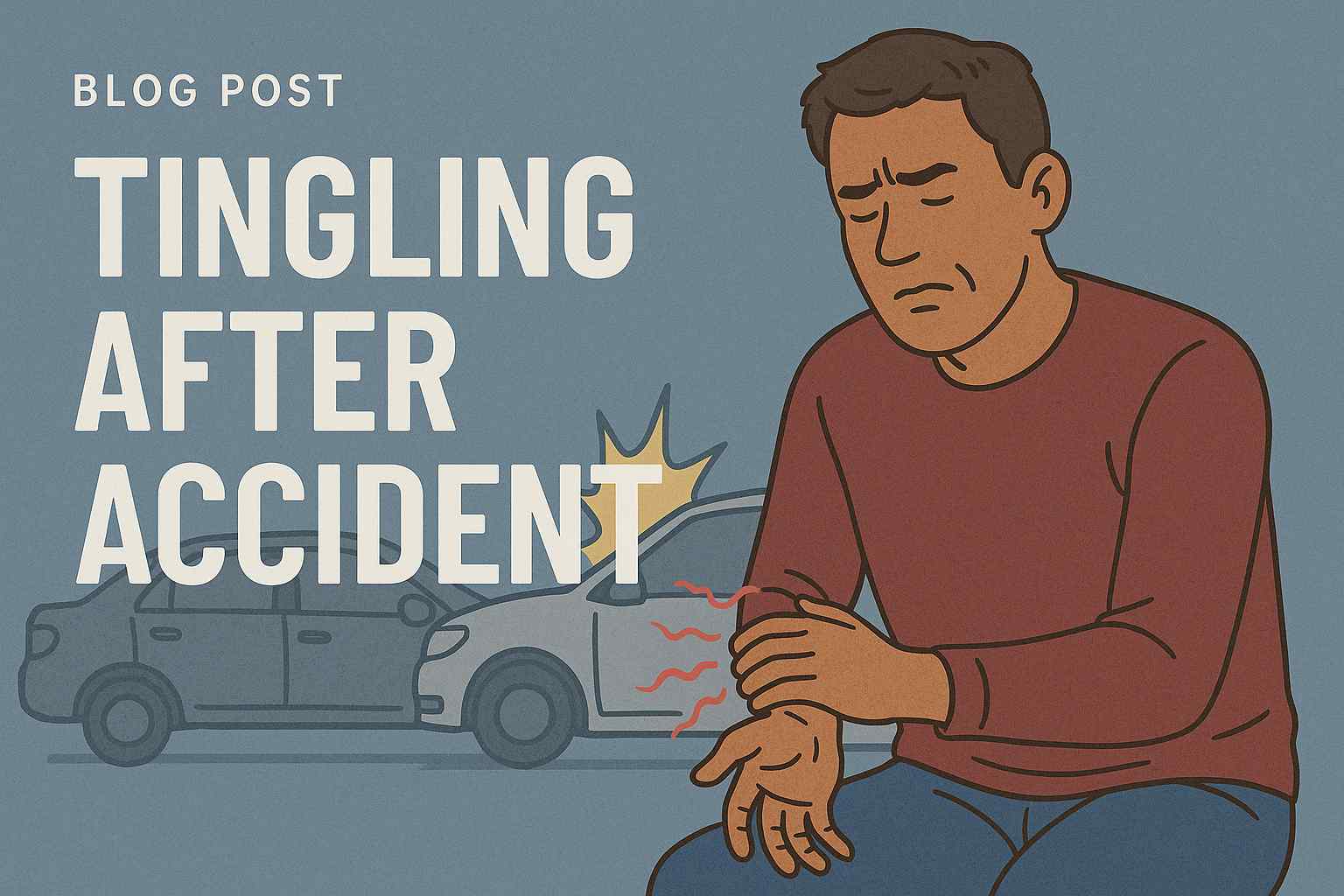Tingling After Accident

Understanding the Causes, Risks, and Legal Options for Tingling After a Car Crash or Fall
Experiencing tingling after an accident can be alarming. You may feel pins and needles in your arms, legs, hands, or feet. Sometimes the feeling is constant. Other times it comes and goes. If you’ve been in a car crash, slipped and fell, or suffered any other trauma, tingling may be a sign of something more serious—especially if it doesn’t go away. At Anderson Franco Law, we help injury victims across California understand their symptoms and get compensation when others are responsible.
This article explains what tingling after an accident could mean, what to do about it, and how a lawyer can help if you’re facing long-term effects or medical bills.
What Does Tingling After an Accident Mean?
Tingling, also called “paresthesia,” is a sensation similar to pins and needles. It can feel like burning, buzzing, numbness, or weakness. Many people feel it in their fingers, toes, arms, or legs. Tingling after an accident often points to nerve damage or irritation. It may be a sign of injury to the spine, brain, or soft tissues.
Even a low-speed accident or minor fall can jolt your body enough to pinch a nerve or herniate a disc. While some tingling goes away with time, other cases may worsen without treatment. If you feel tingling, especially along with pain or weakness, it’s important to take it seriously.
Common Causes of Tingling After a Crash or Fall
Not all tingling sensations are the same. The location, timing, and cause of your accident all help explain what’s happening in your body. Below are common causes of tingling after an injury:
1. Herniated Disc
A herniated disc happens when one of the discs between your spine bones slips out of place or ruptures. The bulging disc can press against nearby nerves, causing pain, tingling, or numbness. These injuries are common in car crashes and falls, especially when your body twists or absorbs a strong impact. Most commonly, the lumbar disc and cervical discs are damaged during accidents.
2. Spinal Cord Injury
Damage to the spinal cord can cause widespread symptoms, including tingling, numbness, and even paralysis. The spinal cord is the main pathway for nerve signals. If it’s bruised, compressed, or torn, your brain and body may struggle to communicate. Tingling may be one of the first signs of this disruption.
3. Nerve Compression or Pinched Nerve
Whiplash, inflammation, or broken bones can cause swelling in areas where nerves travel. This pressure can “pinch” the nerve, leading to tingling, weakness, or sharp pain. Pinched nerves often affect the neck, shoulders, lower back, or wrists.
4. Peripheral Nerve Injury
If the nerves in your limbs are damaged directly—such as in a crush injury or severe laceration—you may feel tingling near the injury site. These nerves carry information to and from the spine. When damaged, they can misfire, sending false signals to the brain.
5. Traumatic Brain Injury (TBI)
A concussion or more serious brain injury can also cause tingling, especially if the part of the brain that processes sensory information is affected. While brain injuries usually present with symptoms like confusion or headache, tingling can appear days or weeks later.
What If My Tingling Didn’t Start Right Away?
Some people notice tingling hours or even days after the accident. This delay is not uncommon. After a traumatic event, adrenaline and shock can hide symptoms. Swelling around a nerve may take time to build. Or, a minor injury might worsen slowly as your body tries to heal.
Don’t ignore delayed symptoms. Even if you walked away from the accident feeling fine, seek medical attention if tingling or numbness begins later.
When Is Tingling a Medical Emergency?
Tingling is not always urgent. But it becomes an emergency if:
- You cannot control your bladder or bowels
- You lose strength in an arm or leg
- You are unable to walk or stand
- The tingling is paired with severe back pain, confusion, or slurred speech
These symptoms may suggest spinal cord compression or stroke. Go to the emergency room right away.
Diagnosing Tingling After an Accident
If you have tingling, a doctor may order tests to figure out the cause. These may include:
- MRI or CT scans to check for herniated discs or spinal damage
- X-rays to look for broken bones
- EMG tests to measure how nerves and muscles work together
- Physical exams to assess strength, reflexes, and pain triggers
You may be referred to a neurologist, orthopedic doctor, or pain specialist depending on your symptoms.
Treatment Options for Tingling and Nerve Damage
The right treatment depends on the cause. In mild cases, rest and physical therapy may be enough. But if the problem is more serious, treatment may include:
- Anti-inflammatory medication or nerve pain relievers
- Chiropractic care or spinal adjustments
- Epidural steroid injections
- Surgery to decompress nerves or repair a disc
- Long-term rehabilitation
Some injuries may never fully heal. Chronic tingling can impact your ability to work, drive, or enjoy your normal life.
Why You Should Speak to a Personal Injury Lawyer
If your tingling started after an accident that was someone else’s fault, you may be entitled to compensation. A lawyer can help you recover money for:
- Medical bills (past and future)
- Lost wages or reduced ability to work
- Pain and suffering
- Emotional distress
Proving the connection between the accident and your symptoms may require medical evidence and expert opinions. Insurance companies often try to downplay injuries like tingling or claim it was caused by something else. That’s why it’s important to document your symptoms early and speak to an attorney.
At Anderson Franco Law, we help injury victims across California—including in San Francisco—navigate their legal options and build strong cases. We’re here to listen and advocate for you.
What If You Didn’t Go to the Doctor Right Away?
Many people wait to see a doctor. Maybe you didn’t feel hurt at first. Maybe you didn’t have health insurance. But delayed treatment does not mean you lose your legal rights.
It’s still possible to bring a claim if you later realize the accident caused your symptoms. The key is to act quickly once you recognize a problem. Let your doctor know when the tingling began, and explain that it started after your crash or fall.
How a Lawyer Can Help With Long-Term Tingling or Nerve Damage
Insurance companies often offer quick settlements. But those amounts may not cover long-term care or future surgeries. A personal injury lawyer can help calculate the full cost of your injury, including:
- Specialist visits
- Imaging and testing
- Physical therapy
- Time off work
- Lifestyle changes caused by chronic symptoms
We can also work with neurologists, physical medicine doctors, and other experts to show the impact of your injury. At Anderson Franco Law, we’ve handled many cases where clients experienced ongoing pain, numbness, and tingling—even after “mild” accidents.
Tingling After a Workplace Accident or Fall? You May Have a Workers’ Comp Case
If you suffered tingling after an accident at work, you may be eligible for workers’ compensation benefits. In California, employers are required to cover medical treatment and provide partial wage replacement for injured workers.
Tingling may be a sign of a back injury, repetitive strain, or trauma caused by unsafe work conditions. Whether you slipped on a wet floor, lifted something heavy, or had machinery hit you, don’t ignore your symptoms. A lawyer can help make sure your employer and their insurance company give you the benefits you deserve.
Don’t Wait to Get Help for Tingling After an Accident
If you feel tingling after an accident, trust your body. It’s telling you something’s wrong. Whether it’s nerve damage, a herniated disc, or another hidden injury, the sooner you get help, the better your recovery can be.
At Anderson Franco Law, we offer free consultations and serve clients throughout California. If someone else’s negligence caused your injuries, we’ll fight to get you the compensation you deserve.









